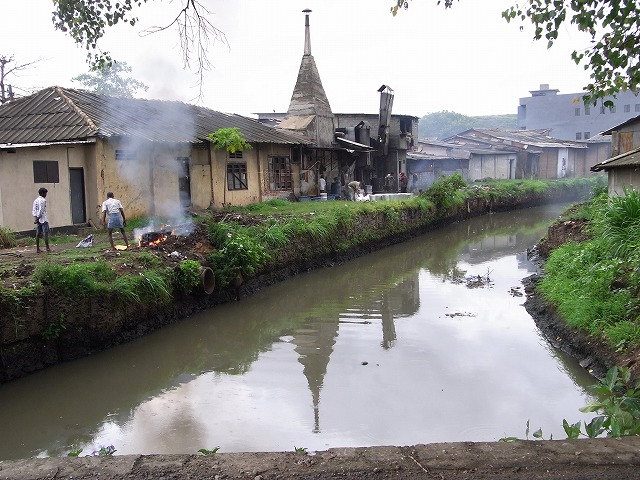Justice for Water: Analysing water samples in selected hot spots in Sri Lanka
 |
Centre for Environmental Justice (CEJ) |
 |
Hemantha Withanage |
 |
|
 |
JPY 450,000 |

Water channel in Colombo
Research Background
CEJ has been involved in monitoring the environmental status in Sri Lanka since 2004. We have found that water pollution in Sri Lanka is a serious problem. Heavy metals in water have become a serious health and environmental issue. According to some academics Lead, Cadmium, Chromium and Mercury have been found in some locations in excessive levels.
The sources for the heavy metal pollution may be varying from industries to artificial fertilizer. Some believe that the source for cadmium found in drinking well water in the North Central province is the heavy use of fertilizer over many years. On the other hand many industries which operate in Sri Lanka have not obtained the Environmental Protection Licence. They do not adhere to the permissible and tolerable water quality standards. Industries such as tanning release Chromium in its effluent.
Sri Lanka produces around 3000 tonnes of Garbage daily. Since there is no sanitary fill, all garbage is either burnt or goes to open dumps. It was found that the soil, water and air are heavily polluted in most of the garbage dumping sites. This garbage includes domestic, industrial, hospital and also electronic waste.
Sri Lanka does not have a sanitary land fill. There is no waste sorting. Recycling industry is almost non existent in the country. There is no proper mechanism to deal with electronic waste and other hazardous wastes. As a result, these wastes come to the water bodies which carry the pollution to a long distance. This also pollutes the ground water.
In order to learn the water quality in the public water bodies and drinking water sources we would like to conduct a research with the following objectives.
1. Test the water quality in public water bodies with special emphasis to Pb, Cd, Hg and biological parameters i.e. BOD and coli form levels.
2. Mapping of the water quality in selected areas
3. Detailed study of the available laws and their adequacy to meet the required standards
4. Produce a publication entitled "Justice for Waters"
We are hoping to collaborate with the academic institutions and laboratories to test the water samples collected from identified hot spots. The results will be published and shared with the relevant agencies, public and media in order to encourage suitable actions to arrest the growing problem.
Mapping of the water quality is an important action to educate public on finding suitable water for drinking and agriculture.
The legal study will help to understand the legal gaps and necessary amendments for ensuring the healthiness of the public water bodies. It can be used to advocate the relevant agencies and courts on the suitable actions to ensure public safety and justice to waters.
[Sep. 2009]
Final Report (abstract)
CEJ has been involved in monitoring the environmental status in Sri Lanka since 2004. We have found that water pollution in Sri Lanka is a serious problem. Heavy metals in water have become a serious health and environmental issue. According to some academics Lead, Cadmium, Chromium and Mercury have been found in some locations in excessive levels.
The sources for the heavy metal pollution may be varying from industries to artificial fertilizer. Some believe that the source for cadmium found in drinking well water in the North Central province is the heavy use of fertilizer over many years. On the other hand many industries which operate in Sri Lanka have not obtained the Environmental Protection Licence. They do not adhere to the permissible and tolerable water quality standards. Industries such as tanning release Chromium in its effluent.
Sri Lanka produces around 3000 tonnes of Garbage daily. Since there is no sanitary fill, all garbage is either burnt or goes to open dumps. It was found that the soil, water and air are heavily polluted in most of the garbage dumping sites. This garbage includes domestic, industrial, hospital and also electronic waste.
Sri Lanka does not have a sanitary land fill. There is no waste sorting. Recycling industry is almost non existent in the country. There is no proper mechanism to deal with electronic waste and other hazardous wastes. As a result, these wastes come to the water bodies which carry the pollution to a long distance. This also pollutes the ground water.
In order to learn the water quality in the public water bodies and drinking water sources we would like to conduct a research with the following objectives.
1. Test the water quality in public water bodies with special emphasis to Pb, Cd, Hg and biological parameters i.e. BOD and coli form levels.
2. Mapping of the water quality in selected areas
3. Detailed study of the available laws and their adequacy to meet the required standards
4. Produce a publication entitled "Justice for Waters"
We are hoping to collaborate with the academic institutions and laboratories to test the water samples collected from identified hot spots. The results will be published and shared with the relevant agencies, public and media in order to encourage suitable actions to arrest the growing problem.
Mapping of the water quality is an important action to educate public on finding suitable water for drinking and agriculture.
The legal study will help to understand the legal gaps and necessary amendments for ensuring the healthiness of the public water bodies. It can be used to advocate the relevant agencies and courts on the suitable actions to ensure public safety and justice to waters.
[Dec. 2010]
Others
